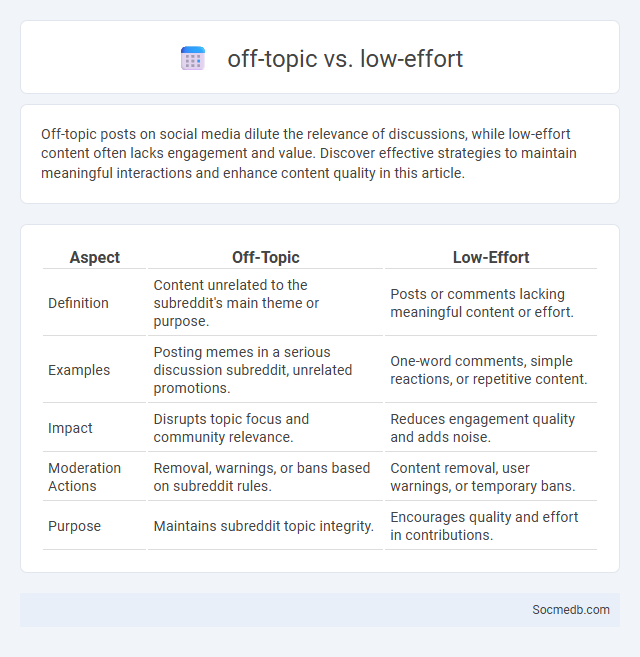
Photo illustration: off-topic vs low-effort
Off-topic posts on social media dilute the relevance of discussions, while low-effort content often lacks engagement and value. Discover effective strategies to maintain meaningful interactions and enhance content quality in this article.
Table of Comparison
| Aspect | Off-Topic | Low-Effort |
|---|---|---|
| Definition | Content unrelated to the subreddit's main theme or purpose. | Posts or comments lacking meaningful content or effort. |
| Examples | Posting memes in a serious discussion subreddit, unrelated promotions. | One-word comments, simple reactions, or repetitive content. |
| Impact | Disrupts topic focus and community relevance. | Reduces engagement quality and adds noise. |
| Moderation Actions | Removal, warnings, or bans based on subreddit rules. | Content removal, user warnings, or temporary bans. |
| Purpose | Maintains subreddit topic integrity. | Encourages quality and effort in contributions. |
Understanding Off-Topic Content
Off-topic content on social media disrupts engagement by diverting discussions away from the main subject, reducing the relevance of posts and comments. Identifying and managing off-topic posts helps maintain community focus and enhances meaningful interactions. You benefit from a clearer, more coherent social media environment that fosters productive conversations and stronger connections.
Defining Low-Effort Submissions
Low-effort submissions on social media refer to content that requires minimal creativity, effort, or originality, such as reposts, generic comments, or brief, uninspired posts. These types of contributions often fail to engage your audience and can dilute the overall quality of your social media presence. Prioritizing meaningful, well-crafted content enhances user interaction and strengthens your brand's online reputation.
Rule Violation: What It Means
Rule violation on social media refers to actions or content that breach platform-specific guidelines designed to maintain community standards and user safety. Common violations include hate speech, harassment, misinformation, and explicit content, leading to penalties such as content removal, account suspension, or permanent bans. Understanding these violations is crucial for users and businesses to ensure compliance and maintain a positive online presence.
Key Differences Between Off-Topic and Low-Effort
Off-topic social media posts deviate from the main subject or discussion thread, disrupting user engagement and diluting content relevance. Low-effort posts typically lack originality, depth, or meaningful contribution, often consisting of generic comments, memes, or repetitive phrases. Understanding these differences helps maintain community standards and enhances the overall quality of interactions on platforms like Facebook, Twitter, and Reddit.
Examples of Rule Violations in Online Communities
Common rule violations in online communities include hate speech, harassment, and spreading misinformation, which undermine community safety and trust. Other examples involve spamming, posting explicit content, and violating copyright laws, all of which can lead to account suspension or bans. Platforms like Facebook, Twitter, and Reddit enforce strict guidelines to mitigate these behaviors and maintain positive user experiences.
Impact of Off-Topic Posts on Community Quality
Off-topic posts disrupt the flow of conversation and reduce the overall quality of social media communities by diluting relevant discussions and causing frustration among members. Excessive irrelevant content can lead to decreased engagement, lower trust in community moderation, and eventual member attrition. To maintain a vibrant and focused community, you must enforce clear guidelines and encourage content that aligns with the group's purpose.
Recognizing Low-Effort Content at a Glance
Social media users can quickly identify low-effort content by noting repetitive phrases, lack of original insight, and poor visual quality. Posts relying heavily on clickbait headlines or generic stock images often indicate minimal effort. Algorithms also flag such content due to low engagement rates and high bounce metrics, signaling weak value to the audience.
Moderation Strategies for Rule Enforcement
Effective social media moderation strategies involve automated content filtering, human review teams, and user reporting systems to enforce platform rules consistently. Employing AI-driven algorithms helps detect harmful or violating content quickly, while trained moderators ensure contextual judgment in ambiguous cases. Transparent enforcement policies combined with user education foster community trust and compliance, crucial for sustainable online environments.
Best Practices to Avoid Rule Violations
Adhering to platform-specific community guidelines and regularly reviewing terms of service minimizes the risk of social media rule violations. Employing privacy settings, avoiding hate speech, misinformation, and spam ensures compliance with algorithms and promotes positive engagement. Monitoring account activity with analytics tools helps detect and correct potential infractions promptly, protecting brand reputation and user trust.
Building a Healthier Community Through Clear Guidelines
Clear social media guidelines promote respectful interactions and reduce harmful content, fostering a healthier online community. You can contribute by understanding and following platform policies that prioritize safety, inclusivity, and accurate information. Consistent enforcement of these rules encourages positive engagement and trust among users.
 socmedb.com
socmedb.com